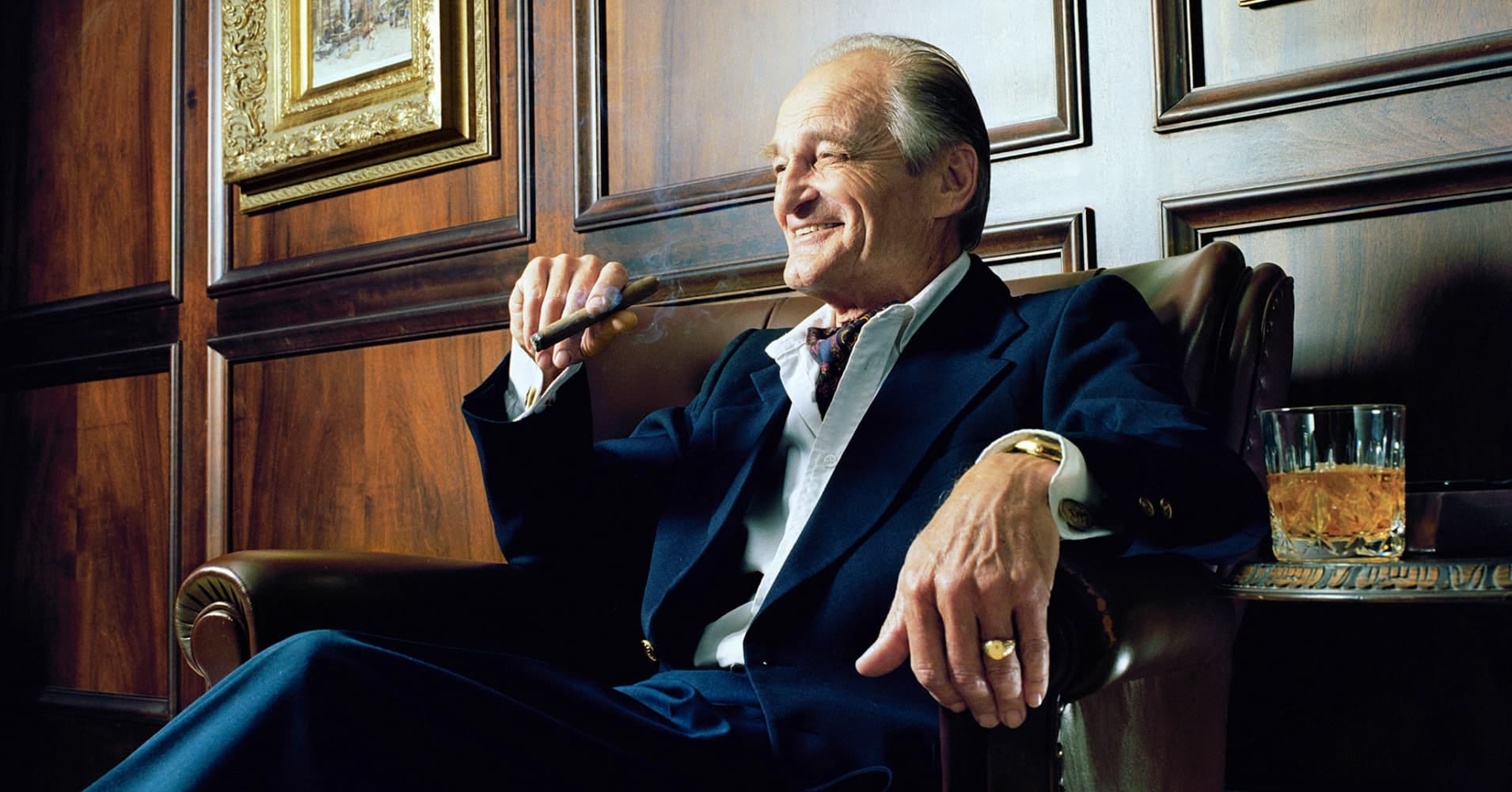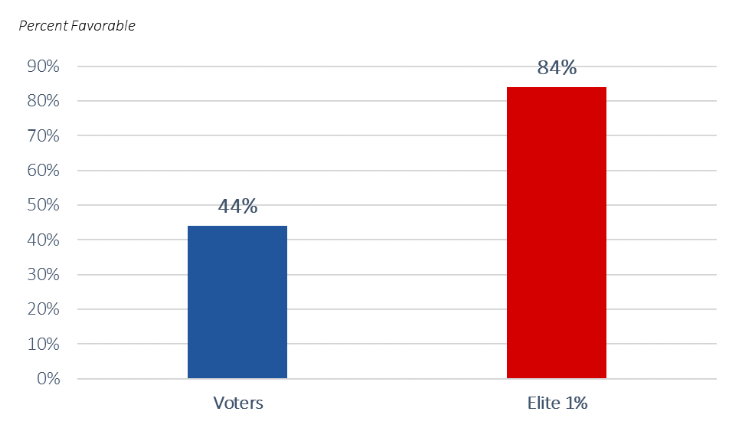What do the Top 1% believe?
A recent poll shows a huge gap in the beliefs between the Top 1% and the rest of us…
Make someone’s day: Gift a subscription to your friends and family!
One of the Five Keys to Progress is decentralized political, economic, religious, and ideological power. I have written other articles on the danger of centralized political power, particularly the federal government in the United States and the European Union in Europe. I have also written articles on the dangers of monopolies, which are examples of centralized economic power.
Another very real danger in wealthy Western societies is an ideological centralization of power. I admit that the phrasing is a little awkward, but I am trying to keep the phrasing of the Five Keys to Progress general enough to apply to all societies over the last 10,000 years.
By “decentralized ideological power,” I mean that the institutions in society and those people who are in the upper and middle ranks of those institutions have a reasonable variation of ideological preferences so that institutions do not all make the same mistake as an outcome of a rigid group-think mentality. It is particularly harmful if those ideological beliefs deliberately or unintentionally undermine the preconditions of material progress.
Unfortunately, I believe that is exactly what is happening today.
A very interesting opinion poll was recently released by Rasmussen on the political beliefs of elites in American society. Of course, the definition of elite is highly contested. Rasmussen defined an elite as:
Holding a postgraduate degree
Annual household income of more than $150,000
Living in a zip code with more than 10,000 people per square mile (as a point of comparison, there are 140 metro areas that meet that criteria)
This amounts to approximately 1% of the total US population.
Rasmussen’s definition is not necessarily how I would define “elite,” but their definition seems as good as any other. The poll consisted of two separate surveys in September 2023. Each survey had 1000 respondents who fit the criteria. Roughly half of those who met the criterion of “elite” attended Ivy League schools or other elite private schools, such as Stanford or Duke.
So what were the results?
Note: the actual poll results seem to be paywalled, so I have had to cobble together the following from press reports. If anyone has access to the entire survey results including the exact wording of the questions, please add a link in the comments.
See also my other articles and podcasts on Ideology:
Why Ideologies Threaten Progress (Part 1 of 3-part podcast series)
Why ideologies fail (podcast)
Descent into a man-made Hell: Understanding modern Totalitarianism
You might also be interested in reading my “From Poverty to Progress” book series:
Q: Partisan identification (I cannot find the actual wording of the question in press accounts)
73% of Elites consider themselves Democrats
14% consider themselves Republicans
My Comment: Among the general population, the percentages are roughly equal with both hovering a little over one quarter of the electorate with Independents making up close to a majority.
Elites have a huge partisan imbalance that seems likely to introduce ideological groupthink into our institutions. I do not know how long this imbalance has persisted, but it seems likely to become very sizeable by the 2010s. I think this is an important reason why many (if not most Americans) think things have gone terribly wrong over the last 10 years.
Q: Suppose that your favorite candidate loses a close election. However, people on the campaign know that they can win by cheating without being caught. Would you rather have your candidate win by cheating or lose by playing fair?
All Americans, just 7% said they would want their candidate to win by cheating.
Elites: 35% said they would want their candidate to win by cheating, and 69% among those who talk about politics every day.
My Comment: The fact that a majority of polically-engaged elites favor cheating in elections is chilling. It suggests that the most politically influential elites do not believe in transparent competition between elites via elections. From their perspective, if the “wrong” candidate is likely to win, then cheating is acceptable. Given those those people are exactly the ones most likely to donate money to political campaigns, this attitude is likely to filter down to candidates and party leadership.
Given the long history of ballot fraud in the United States, this will not end well. It only reinforces my belief that the potential for ballot fraud is a very serious problem in the United States.
Q: In general you trust the government to do the right thing? (again, not exact wording)
Elites: 70% said yes
All Americans: 35% said yes
Q: Do you approve of the job Joe Biden is doing as president?
My comment: I doubt that there has been another president over the last 80 years that has such a huge gap in support between elites and the people. It is quite possible that FDR had similar gaps in the mid-1930s, but with greater support from the people and hostility coming from elites.
Q: Does the United States have too much individual freedom, too much government control, or is the balance about right?
Among the one-third of elites who discuss politics daily, 69% believe the US has too much freedom.
My Comment: The fact that a strong majority of the most politically active elites believe that “the United States has too much individual freedom” and “cheating” is acceptable if “your favorite candidate loses a close election” and only small minorities within that same group disagree is very disturbing.
This suggests that the threat to democracy is not coming from “populists” but from the elites themselves.
Q: To fight climate change, would you favor or oppose the strict rationing of gas, meat, and electricity
Q: To fight climate change would you favor banning each of the following?
If you had a choice between a candidate who said that teachers and other education professionals should decide what students are taught and a candidate who said that parents need more control over what their children are taught. For whom would you vote?
I really wish that I had access to the full survey results as it is a fascinating glimpse into the political beliefs of at least one portion of American elites. Regardless of whether you agree or disagree with their beliefs, one must admit that the gulf between Elites and the rest of the American people is very large. It is also quite clear that Elites are very vulnerable to a groupthink mentality that can lead to dysfunctional decision-making by our institutions.
It seems likely that American politics will continue to polarize around:
Those who agree with the Elites, and
Those who do not.
See also my other articles and podcasts on Ideology:
Why Ideologies Threaten Progress (Part 1 of 3-part podcast series)
Why ideologies fail (podcast)
Descent into a man-made Hell: Understanding modern Totalitarianism
You might also be interested in reading my “From Poverty to Progress” book series:











The postgraduate education predictability skews this to democrats, but wow, the gaps in policy preferences are stark. The gaps look like more evidence for the correlation between intelligence and overconfidence in judgements that Gurwinder covered.
Elites having vastly different opinions from the masses and being willing to impose their agenda doesn't strike me as a recent phenomenon,history has always been like that.Elites being supportive of freedom of speech especially is a striking exception of time and place.This polling suggests young people seem to have less confidence in democracy and liberalism.